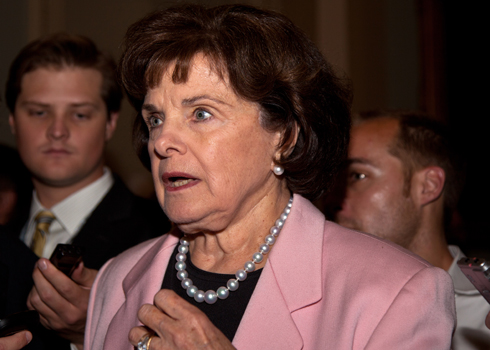Sen. Dianne Feinstein (D-CA) isn’t relying on U.S. intelligence officials alone to find out whether the Pakistani government was helping harbor Osama bin Laden.
Feinstein, who chairs the Senate intelligence committee, told TPM she has “her own people looking into it” and will hold closed-door classified hearings on the increasingly frayed relationship between the U.S. and Pakistan soon.
Despite her deep concerns about what the Pakistani government knew about bin Laden’s compound before a U.S. assault team raided it and killed the notorious al Qaeda leader, Feinstein tempered remarks Monday in which she questioned continuing to send billions of dollars in humanitarian and military aid to the country and said the relationship between the U.S. and Pakistan “makes less and less sense.”
“I’m not questioning the aid. It’s just if [bin Laden] lived there for five or six years, I don’t understand them not knowing,” she told TPM. “We all know what it’s like to live in a neighborhood — and that was a big compound in city that was also home to a military academy.”
Still, Feinstein did not defend the aid to Pakistan — and in that way she broke with the two top members of the Senate Foreign Relations Committee, Sens. John Kerry (D-MA) and Dick Lugar (R-IN), who both said on the Sunday shows aid should continue to Pakistan because of the country’s critical role in anti-terrorism efforts.
Lugar Tuesday told TPM that very little of the humanitarian aid appropriated for Pakistan has been allocated because of U.S. concerns about its accountability. Kerry and Lugar co-sponsored a bill to provide Pakistan with $7.5 billion over five years. Just $179 million of the first year’s $1.5 billion has been spent because of concern about Pakistani corruption and incompetence. These funds are separate from the military aid the U.S. provides Pakistan, he noted.
Earlier this year before bin Laden’s killing, Kerry and Lugar urged U.S. officials to allocate the money at a faster pace. Lugar is continuing to urge U.S. officials to stay engaged with Pakistan despite the finger-pointing over bin Laden.
“Given the current ill will about the death of OBL the relationship has become very distrustful but we need to stay engaged and evaluate it on a day-to-day basis,” he said.
Sen. Ron Wyden (D-OR), a senior member of the intelligence panel, also stopped short of calling for the U.S. to cut off aid to the country even though he acknowledged the intense level of distrust between Washington and Islamabad.
“It seems to me the events of the last few days have certainly changed the debate,” Wyden said. “There are so many unanswered questions — the idea that bin Laden was there for years and years? It raises serious concerns.”
Earlier Tuesday foreign policy experts warned against a precipitous draw-down of U.S. forces in Afghanistan, which could create even more instability for the nuclear-armed Pakistan and more opportunities for the Taliban and al Qaeda to grow in influence and power.
“We tend to hear a lot about the ways in which Pakistani safe havens can destabilize Afghanistan, and they do,” said Stephen Biddle, a fellow at the Council on Foreign Relations. “But the bigger problem is the long-run danger that if we should fail in Afghanistan, the result could be to tip an unstable Pakistan into collapse, with grave implications for United States security.”









